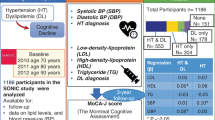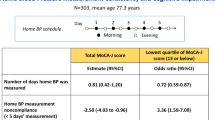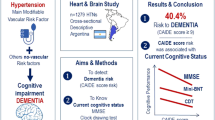Abstract
The aim of this study was to compare the effect of the beta-adrenergic blocker atenolol and the Angiotensin II type 1 (AT1) receptor antagonist losartan on cognitive function in very elderly hypertensive patients. A total of 120 mild to moderate essential hypertensive (DBP >90 and <105 mmHg) patients, aged 75–89 years, were studied. After a 4-week wash-out period on placebo, they were randomized to receive atenolol 50 mg or losartan 50 mg for 24 weeks according to a parallel arm design. At the end of the placebo period and of each active treatment period, BP was measured (by mercury sphygmomanometer, Korotkoff I and V) and cognitive function was evaluated through three different tests (word list memory, word list recall and word list fluency). Both atenolol and losartan were equally effective in reducing SBP (−22.1 and −23.1 mmHg, respectively, P< 0.01 vs baseline) and DBP (−10.3 and −11.2 mmHg, respectively, P< 0.01 vs baseline). Atenolol treatment did not induce significant changes in any test score, whereas losartan significantly increased the score of both the word list memory (+2.2, P<0.05 vs baseline) and the word list recall test (+2.1, P<0.05 vs baseline). The comparison between losartan and atenolol was significant (P<0.05) for both memory tests. These data suggest that in very elderly hypertensive patients, chronic AT1 receptor blockade by losartan could improve cognitive function, in particular immediate and delayed memory.
This is a preview of subscription content, access via your institution
Access options
Subscribe to this journal
Receive 12 digital issues and online access to articles
$119.00 per year
only $9.92 per issue
Buy this article
- Purchase on Springer Link
- Instant access to full article PDF
Prices may be subject to local taxes which are calculated during checkout
Similar content being viewed by others
References
Asvarsson O, Skoog I . A population study on the incidence of dementia disorders between 85 and 88 years of age. J Am Geriatr Soc 1996; 44: 1455–1460.
Melzer D, Ely M, Brayne C . Cognitive impairment in elderly people: population based estimate of the future in England, Scotland and Wales. BMJ 1997; 315: 462.
Ott A et al. A. Incidence and risk of dementia: The Rotterdam Study. Am Heart J 1998; 147: 574–580.
Miller RE et al. Effect of antihypertensive treatment on the behavioral consequences of elevated blood pressure. Hypertension 1984; 6: 202–208.
Farmer ME et al. Longitudinally measured blood pressure, antihypertensive medication use and cognitive performance:the Framingham Study. J Clin Epidemiol 1990; 43: 475–480.
Launer LJ et al. Midlife blood pressure and dementia:the Honolulu-Asia aging study. Neurobiol Aging 2000; 21: 49–55.
Skoog I et al. Fifteen-year longitudinal study of blood pressure and dementia. Lancet 1996; 347: 1141–1145.
Kilander L et al. H. Hypertension is related to cognitive impairment: a 20-year follow-up of 999 men. Hypertension 1998; 31: 780–786.
Farmer M et al. Blood pressure and cognitive performance: the Framingham Study. Am J Epidemiol 1987; 126: 1103–1114.
Scherr P, Hebert L, Smith L, Evans D . Relation of blood pressure to cognitive function in the elderly. Am J Epidemiol 1991; 134: 1303–1315.
Starr JM, Whalley LJ, Inch S, Shering PA . Blood pressure and cognitive function in healthy old people. J Am Geriatr Soc 1993; 41: 753–756.
Breteler MMb, Claus JJ, Grobbee DE, Hofman A . Cardiovascular disease and distribution of cognitive function in elderly people: the Rotterdam Study. BMJ 1994; 304: 1604–1608.
Guo Z, Viitanen M, Fratiglioni L, Winblad B . Low blood pressure and dementia in elderly people: the Kungsholmen project. BMJ 1996; 321: 805–808.
Gale CR, Martyn CN, Cooper C . Cognitive impairment and mortality in a cohort of elderly people. BMJ 1996; 312: 608–611.
Cacciatore F et al. The role of blood pressure in cognitive impairment in an elderly population. J Hypertens 1997; 15: 135–142.
Starr JM, Whalley LJH, Deary IJ . The effects of antihypertensive treatment on cognitive function: results from the HOPE Study. J Am Geriatr Soc 1996; 44: 411–415.
Forette F et al. Prevention of dementia in randomised double-blind placebo-controlled Systolic Hypertension in Europe (Syst-Eur) trial. Lancet 1998; 352: 1347–1351.
Tzourio C, Dufouil C, Ducimetiere P, Alperovitch A . Cognitive decline in individuals with high blood pressure: a longitudinal study in the elderly. EVA Study Group. Epidemiology of Vascular Aging. Neurology 1999; 53: 1948–1952.
Guo Z et al. Occurrence and progression of dementia in a community population aged 75 years and older: relationship of antihypertensive medication use. Arch Neurol 1999; 56: 991–996.
Light KC . Slowing of response time in young and middle-aged hypertensive patients. Exp Aging Res 1975; 1: 209–227.
Light KC . Effects of mild cardiovascular and cerebrovascular disorders on serial reaction time performance. Exp Aging Res 1978; 4: 3–22.
Schultz NR et al. WAIS performance in different age groups of hypertensive and control subjects during administration of a diuretic. J Gerontol 1979; 34: 246–253.
Elias MF et al. Clinical significance of cognitive performance by hypertensive patients. Hypertens 1987; 9: 192–197.
Applegate WB et al. Impact of the treatment of isolated systolic hypertension on behavioral variables. Results from the systolic hypertension in the elderly program. Arch Intern Med 1994; 154: 2154–2160.
Prince MJ, Bird AS, Blizard RA, Mann AH . Is the cognitive function of older patients affected by antihypertensive treatment? Results from the Medical Research Council's Trial of hypertension in older adults. BMJ 1996; 312: 801–805.
Gosh SK . Methyldopa and forgetfulness. Lancet 1976; 1: 202–203.
Solomon S et al. Impairment of memory function by antihypertensive medication. Arch Gen Psychiatry 1983; 40: 1109–1112.
Goldstein G et al. Treatment of hypertension in the elderly. II-Cognitive and behavioral function. Hypertension 1990; 15: 361–369.
Skinner MH et al. Atenolol compared with nifedipine: effect on cognitive function and mood in elderly hypertensive patients. Ann Intern Med 1992; 116: 615–623.
Vanmolkot FHM, DeHoon JNJN, Van de Ven LLM, Van Bortel LMAB . Impact of antihypertensive treatment on quality of life: comparison between bisoprolol and bendrofluazide. J Hum Hypertens 1999; 13: 559–563.
Perez-Stable EJ et al. The effects of propranolol on cognitive function and quality of life: a randomized trial among patients with diastolic hypertension. Am J Med 2000; 108: 359–365.
Bulpitt CJ, Connor M, Schule M, Fletcher AE on behalf of the European Bisoprolol Trial Investigators. Bisoprolol and nifedipine retard in elderly hypertensive patients: effect on quality of life. J Hum Hypertens 2000; 14: 205–212.
Palmer A et al. A comparison of verapamil and nifedipine on quality of life. Br J Clin Pharmac 1990; 30: 365–370.
Testa MA et al and the nifedipine Gits Study Group. Quality of life and calcium channel blockade with nifedipine GITS versus amlodipine in hypertensive patients in Spain. J Hypertens 1998; 16: 1938–1947.
Currie D et al. Central effects of the angiotensin-converting enzyme inhibitor, captopril. I–Performance and subjective assessment of mood. Br J Clin Pharmacol 1990; 30: 527–536.
Wyss JM, Fisk G, Van Groen T . Impaired learning and memory in mature spontaneously hypertensive rats. Brain Res 1992; 592: 135–140.
Starr JM, Whalley LJ . Ace-Inhibitors: Central Actions. Raven Press: New York, 1994.
Tedesco MA et al. Efficacia e tollerabilità del losartan ed effetto sulla massa ventricolare sinistra in pazienti con ipertensione essenziale. Cardiologia 1998; 43: 53–59.
Tedesco MA et al. Comparison of losartan and hydrochlorothiazide on cognitive function and quality of life in hypertensive patients. Am J Hypertens 1999; 12: 1130–1134.
Starr JM, Whalley LJ . Senile hypertension and cognitive impairment. An overview. J Hypertens 1992; 10 (Suppl): S31–S42.
Guo Z, Fratiglioni L, Winblad B, Vittanen M . Blood pressure and performance on the mini-mental state examination in the very old. Cross-sectional and longitudinal data from the Kungsholmen Project. Am J Epidemiol 1997; 145: 1106–1113.
Morris JC et al. The Consortium to Establish a Registry for Alzheimer's disease (CERAD) I Clinical and neuropsychological assessment of Alzheimer's disease. Neurology 1989; 39: 1159–1165.
Isaacs B, Kennie AT . The Set test as an aid to the detection of dementia in old people. Br J Psychiatry 1973; 123: 467–470.
Allen AM et al. Angiotensin receptors in the nervous system. Brain Res Bull 1998; 47: 17–28.
Gard PR . The role of angiotensin II in cognition and behaviour. Eur J Pharmacol 2002; 438: 1–14.
Baranowska D, Braszko JJ, Wisniewski K . Effect of angiotensin II and vasopressin on acquisition and extintion of conditioned avoidance in rats. Psychopharmacology 1983; 81: 247–251.
Braszko JJ, Wisniewski K, Kupryszewski G, Witczuk B . Angiotensin II (3-8)-hexapeptide affects motor activity, performance of passive avoidance and conditioned avoidance responses in rats. Neuroscience 1988; 27: 777–783.
Braszko JJ et al. The 3-7 fragments of angiotensin II is probably responsible for its psychoactive properties. Brain Res 1991; 542: 49–54.
Wright JW et al. Contributions of the brain angiotensin IV-At4 receptor subtype system to spatial learning. J Neurosci 1999; 19: 3952–3961.
Chai SY et al. Distribution of angiotensin IV binding sites (AT4 receptor) in the human forebrain, midbrain and pons as visualised by in vitro receptor autoradiography. J Chem Neuroanat 2000; 20: 339–348.
Pederson ES, Krishnan R, Harding JW, Wright JW . A role for the Angiotensin AT4 receptor subtype in overcoming sopolamine-induced spatial memory deficits. Regul Pep 2001; 102: 147–156.
Okuyama S, Sakagawa T, Inagami T . Role of the angiotensin II type –2 receptor in the mouse central nervous system. Jpn J Pharmacol 1999; S1: 259–263.
Braszko JJ . AT2 but not AT1 receptor antagonism abolishes angiotensin II increase of the acquisition of conditioned avoidance responses in rats. Behav Brain Res 2002; 131: 79–86.
Barnes JM et al. Ace-inhibition and cognition. In: McGregor GA, Sever PS (eds). Current Advances in ACE-Inhibition. Churchill Livingstone: London, 1989, pp 159–171.
Barnes JM et al. Cognitive enhancing actions of DuP 753 detected in a mouse habituation paradigm.Neuroreport 1990; 1: 239–242.
Raghavendra V, Chopra K, Kulkarni SK . Involvement of cholinergic system in losartan induced facilitation of spatial and short-term working nemory.Neuropeptides 1998; 32: 417–421.
Raghavendra V, Chopra K, Kulkarni SK . Comparative studies on the memory enhancing actions of captopril and losartan in mice using inhibitory shock avoidance paradigm. Neuropeptides 2001; 35: 65–69.
Hock FJ . Involvement of nitric oxide formation in the action of losartan (DuP 753): effects in an inhibitory avoidance model: Behav Brain res 1994; 61: 163–167.
Li Z, Bains JS, Ferguson AV . Functional evidence that the angiotensin antagonist losartan crosses the blood brain barrier in the rat. Brain Res Bull 1993; 30: 33–39.
Author information
Authors and Affiliations
Corresponding author
Rights and permissions
About this article
Cite this article
Fogari, R., Mugellini, A., Zoppi, A. et al. Influence of losartan and atenolol on memory function in very elderly hypertensive patients. J Hum Hypertens 17, 781–785 (2003). https://doi.org/10.1038/sj.jhh.1001613
Received:
Revised:
Accepted:
Published:
Issue Date:
DOI: https://doi.org/10.1038/sj.jhh.1001613
Keywords
This article is cited by
-
The Brain AT2R—a Potential Target for Therapy in Alzheimer’s Disease and Vascular Cognitive Impairment: a Comprehensive Review of Clinical and Experimental Therapeutics
Molecular Neurobiology (2020)
-
The role of neurotrophins in psychopathology and cardiovascular diseases: psychosomatic connections
Journal of Neural Transmission (2019)
-
Angiotensin II Receptor Blockers Attenuate Lipopolysaccharide-Induced Memory Impairment by Modulation of NF-κB-Mediated BDNF/CREB Expression and Apoptosis in Spontaneously Hypertensive Rats
Molecular Neurobiology (2018)
-
Memory is preserved in older adults taking AT1 receptor blockers
Alzheimer's Research & Therapy (2017)
-
Angiotensin II Type 1 Receptor Blockers Inhibit KAT II Activity in the Brain—Its Possible Clinical Applications
Neurotoxicity Research (2017)



